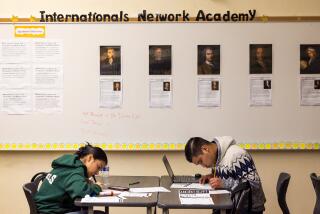Opinion: Companies gaming the visa system is a cruel trick on hard-working Americans
Of all the bait-and-switch tricks, the one that both political and corporate America are pulling on American workers has to be among the meanest.
For years, and especially since the Great Recession, American workers, in particular those who earned their bread in the “old economy,” have heard a single message:
Bootstrap yourselves. Go back to school. Learn the new trades and professions. Make yourselves tech-savvy and marketable, and you’ll have no problem finding jobs in the tech economy, the information economy.
Tell that to about 250 former Disney employees, and about 400 ex-Southern California Edison people.
The Disney data systems employees in Orlando and the tech workers at Edison were laid off in recent months. But many were also told they wouldn’t be leaving until they trained their replacements, workers brought over from India on temporary visas.
These are H-1B visas, and if that sounds like a strain of flu, they are in a way: They’re very contagious. More American companies are demanding that Congress authorize more than the 85,000 H-1Bs now allowed every year. Businesses can contract with companies that get those temporary work permit visas, and then pay foreigners less than American workers. The workers get sent home when the visas expire. No messy longtime hometown employees to contend with, no retirement plans to pay into, no unions to butt heads with.
The visas are supposedly reserved for “specialty occupations” that require “highly specialized knowledge” that companies supposedly can’t find American workers to fill.
But the fact that the fired American workers are training the foreigners who are replacing them shows that rule for the fiction it is.
And it raises -- surprise -- the possibility that companies are gaming the visa system while arguing that they need still more H-1B visas.
In Edison’s case, the Indian visa holders get paid $65,000 to $71,000, according to federal records, compared with the $80,000 to $160,000 Edison paid its homegrown tech folks.
Technically, the visa holders aren’t employees of Edison or Disney. They work for middlemen, the labor contractors that recruit them, which allows the American businesses to argue, with more accuracy than honesty, that the visa holders don’t work for them.
Rep. Judy Chu, the Monterey Park Democrat, is among federal legislators who wants an investigation; she says she has been told by Homeland Security that it plans to “review visa petitions” about Rosemead-based Edison.
Vista Republican Rep. Darrell Issa characterized the reported Edison switcheroo as an apparent “example of precisely what the H-1B visa is not intended to be: a program to simply replace American workers en masse with cheap labor from overseas.”
And in the Senate, Alabama Republican Jeff Sessions has been sounding the alarm about this for years, demanding that his colleagues join him in closing loopholes. As he told the Huntsville Times, the visa program “has become a vehicle for displacing many of our most talented Americans with lower-paid workers from abroad …. Two-thirds of new entry-level hiring in the tech sector goes to workers from outside the country. There is no ‘shortage’ of qualified Americans – only a shortage of elected officials willing to protect them.”
Outsourcing is bad enough, but this is insourcing, and the way it’s being done is unconscionable. Americans are used to politicians and corporations lying to them, but this is a dirty trick of a different magnitude. It’s telling generations of American citizens to learn new skills for the new livelihoods that await them – and then, like Lucy in the “Peanuts” comic strip, yanking away the football.
Now, it’ll bear watching whether lawmakers will stand up to the corporate push for more visas. All of this is happening at a time when states and cities are courting tech companies in particular to relocate, and politicians are courting campaign donations.
Whatever it is Americans have been going back to school to learn, this is the real, and real hard, lesson about the information economy.
Follow Patt Morrison on Twitter @pattmlatimes
More to Read
A cure for the common opinion
Get thought-provoking perspectives with our weekly newsletter.
You may occasionally receive promotional content from the Los Angeles Times.











